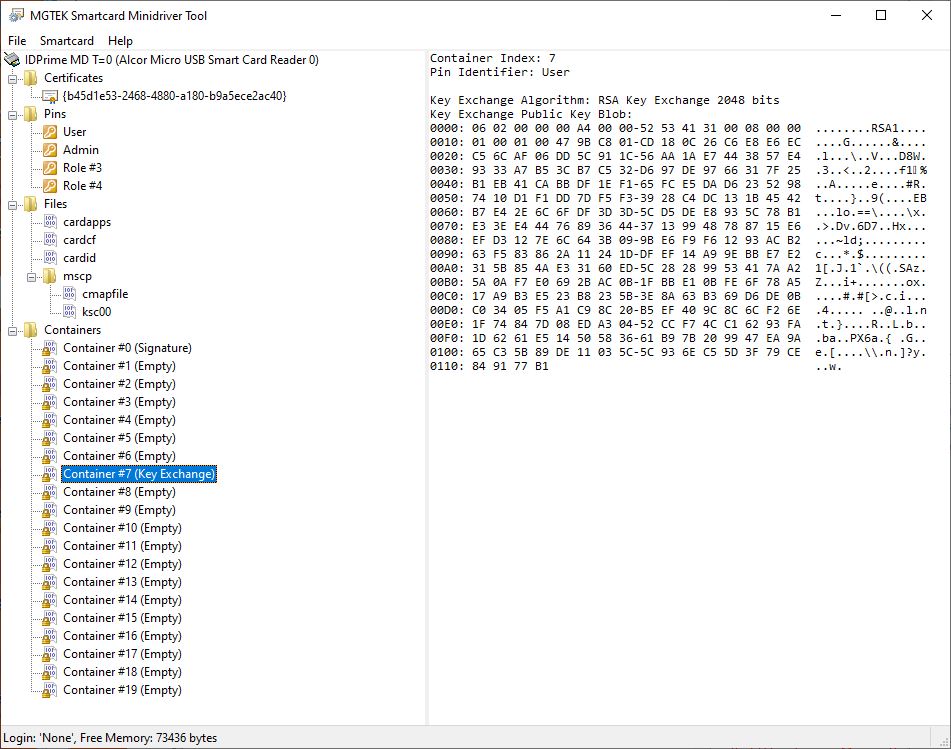|
|
(PowerBuilder) ScMinidriver - Get Public Keys from Smart Card Key Container
Demonstrates how to query a key container on a smart card (or USB token) to get the public part of the private keys that are present. A key container can hold two separate private keys -- one in the "signature" position, and the other in the "key exchange" position.
integer li_rc
oleobject loo_Scmd
string ls_ReaderName
integer li_Success
oleobject loo_Pubkey_sig
oleobject loo_Pubkey_kex
// This example requires the Chilkat API to have been previously unlocked.
// See Global Unlock Sample for sample code.
// Chilkat recommends the following free tool for interactively examining the contents of your smart card
// through the ScMinidriver interface: MGTEK Tool for Minidriver enabled Smart Cards
// Let's first look at our smart card..
// Here's the view of our Gemalto (Thales) IDPrime MD T=0 smart card in the MGTEK tool:
 loo_Scmd = create oleobject
// Use "Chilkat_9_5_0.ScMinidriver" for versions of Chilkat < 10.0.0
li_rc = loo_Scmd.ConnectToNewObject("Chilkat.ScMinidriver")
if li_rc < 0 then
destroy loo_Scmd
MessageBox("Error","Connecting to COM object failed")
return
end if
// First we need to acquire a context to the smart card in the reader where it is inserted.
// Reader names (smart card readers or USB tokens) can be discovered
// via List Readers or Find Smart Cards
ls_ReaderName = "Alcor Micro USB Smart Card Reader 0"
li_Success = loo_Scmd.AcquireContext(ls_ReaderName)
if li_Success = 0 then
Write-Debug loo_Scmd.LastErrorText
destroy loo_Scmd
return
end if
// If successful, the name of the currently inserted smart card is available:
Write-Debug "Card name: " + loo_Scmd.CardName
// We likely shouldn't need to authenticate with the smart card (use a PIN) to simply get a public key,
// so we can skip the PIN authenticatin step..
// Let's get the key(s) present in Container #7.
// In our case (shown in the image above), there is a private key in the "key exchange" position, but no key in the "signature" position.
loo_Pubkey_sig = create oleobject
// Use "Chilkat_9_5_0.PublicKey" for versions of Chilkat < 10.0.0
li_rc = loo_Pubkey_sig.ConnectToNewObject("Chilkat.PublicKey")
loo_Pubkey_kex = create oleobject
// Use "Chilkat_9_5_0.PublicKey" for versions of Chilkat < 10.0.0
li_rc = loo_Pubkey_kex.ConnectToNewObject("Chilkat.PublicKey")
li_Success = loo_Scmd.GetContainerKeys(7,loo_Pubkey_sig,loo_Pubkey_kex)
if li_Success = 0 then
Write-Debug loo_Scmd.LastErrorText
destroy loo_Scmd
destroy loo_Pubkey_sig
destroy loo_Pubkey_kex
return
end if
if loo_Pubkey_sig.Empty = 1 then
Write-Debug "No signature key is present."
else
Write-Debug "Signature key:"
Write-Debug loo_Pubkey_sig.GetPem(1)
end if
if loo_Pubkey_kex.Empty = 1 then
Write-Debug "No Key Exchange key is present."
else
Write-Debug "Key Exchange key:"
Write-Debug loo_Pubkey_kex.GetPem(1)
end if
loo_Scmd.DeleteContext()
Write-Debug "Success."
// Here's the output of the above sample code:
// Card name: IDPrime MD T=0
// No signature key is present.
// Key Exchange key:
// -----BEGIN RSA PUBLIC KEY-----
// MIIBCgKCAQEAsXeRhM55P13FbpNcXAMR3olbw2Wa6keZIHu5YTZYUBTlYWId+pNi
// wUz3zFIEo+0IfYR0H27ybIycQO+1IIzJofUFNMAL3tZps2OKPlsjuCPls6kXpXhv
// /gvhux8LrCtp4PcKWqJ6QVOZKChc7WAx40qFWzHi57ueqRTv3x0kESqGg/VjsqyT
// Evb55psJO2RsfhLT7+YVh3hImRM3RDaJdkTkPuOxeFyT6N7VXD09329sLuS3QkUb
// E9zEKDnz9X3d8dEQdJhSI9ba5fxl8R7fu8pB67ElfzFml96X1jLFtzy1pzOT5Fc4
// ROcaqlYckVzdBq9sxezm6MYmDBjNAcibRwIDAQAB
// -----END RSA PUBLIC KEY-----
destroy loo_Scmd
destroy loo_Pubkey_sig
destroy loo_Pubkey_kex
loo_Scmd = create oleobject
// Use "Chilkat_9_5_0.ScMinidriver" for versions of Chilkat < 10.0.0
li_rc = loo_Scmd.ConnectToNewObject("Chilkat.ScMinidriver")
if li_rc < 0 then
destroy loo_Scmd
MessageBox("Error","Connecting to COM object failed")
return
end if
// First we need to acquire a context to the smart card in the reader where it is inserted.
// Reader names (smart card readers or USB tokens) can be discovered
// via List Readers or Find Smart Cards
ls_ReaderName = "Alcor Micro USB Smart Card Reader 0"
li_Success = loo_Scmd.AcquireContext(ls_ReaderName)
if li_Success = 0 then
Write-Debug loo_Scmd.LastErrorText
destroy loo_Scmd
return
end if
// If successful, the name of the currently inserted smart card is available:
Write-Debug "Card name: " + loo_Scmd.CardName
// We likely shouldn't need to authenticate with the smart card (use a PIN) to simply get a public key,
// so we can skip the PIN authenticatin step..
// Let's get the key(s) present in Container #7.
// In our case (shown in the image above), there is a private key in the "key exchange" position, but no key in the "signature" position.
loo_Pubkey_sig = create oleobject
// Use "Chilkat_9_5_0.PublicKey" for versions of Chilkat < 10.0.0
li_rc = loo_Pubkey_sig.ConnectToNewObject("Chilkat.PublicKey")
loo_Pubkey_kex = create oleobject
// Use "Chilkat_9_5_0.PublicKey" for versions of Chilkat < 10.0.0
li_rc = loo_Pubkey_kex.ConnectToNewObject("Chilkat.PublicKey")
li_Success = loo_Scmd.GetContainerKeys(7,loo_Pubkey_sig,loo_Pubkey_kex)
if li_Success = 0 then
Write-Debug loo_Scmd.LastErrorText
destroy loo_Scmd
destroy loo_Pubkey_sig
destroy loo_Pubkey_kex
return
end if
if loo_Pubkey_sig.Empty = 1 then
Write-Debug "No signature key is present."
else
Write-Debug "Signature key:"
Write-Debug loo_Pubkey_sig.GetPem(1)
end if
if loo_Pubkey_kex.Empty = 1 then
Write-Debug "No Key Exchange key is present."
else
Write-Debug "Key Exchange key:"
Write-Debug loo_Pubkey_kex.GetPem(1)
end if
loo_Scmd.DeleteContext()
Write-Debug "Success."
// Here's the output of the above sample code:
// Card name: IDPrime MD T=0
// No signature key is present.
// Key Exchange key:
// -----BEGIN RSA PUBLIC KEY-----
// MIIBCgKCAQEAsXeRhM55P13FbpNcXAMR3olbw2Wa6keZIHu5YTZYUBTlYWId+pNi
// wUz3zFIEo+0IfYR0H27ybIycQO+1IIzJofUFNMAL3tZps2OKPlsjuCPls6kXpXhv
// /gvhux8LrCtp4PcKWqJ6QVOZKChc7WAx40qFWzHi57ueqRTv3x0kESqGg/VjsqyT
// Evb55psJO2RsfhLT7+YVh3hImRM3RDaJdkTkPuOxeFyT6N7VXD09329sLuS3QkUb
// E9zEKDnz9X3d8dEQdJhSI9ba5fxl8R7fu8pB67ElfzFml96X1jLFtzy1pzOT5Fc4
// ROcaqlYckVzdBq9sxezm6MYmDBjNAcibRwIDAQAB
// -----END RSA PUBLIC KEY-----
destroy loo_Scmd
destroy loo_Pubkey_sig
destroy loo_Pubkey_kex
|

